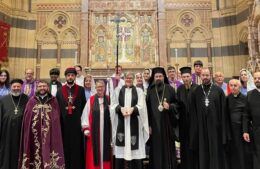Charles Aznavour: Happy 90th
- (0)
Charles Aznavour: Happy 90th –
By Neil Clark
Daily Express

When Charles Aznavour first appeared on stage in a play at the age of nine Adolf Hitler had just become chancellor of Germany, Ramsay MacDonald was the British prime minister and the average wage in the UK was £3.60 a week.
The legendary singer who is 90 tomorrow has been wooing audiences for an incredible 81 years in a career stretching back to 1933.
Moreover the man who has been labelled the Frank Sinatra of France and who makes our very own Sir Bruce Forsyth look like a spring chicken, shows no signs of slowing down.
Only last October he sang at London’s Royal Albert Hall and his performance earned outstanding reviews.
Aznavour is the man of 1,000 songs.
He wrote his first in 1941 when the Nazis were occupying Paris.
But for British music lovers he is probably most associated with two tracks from the mid-1970s, The Old Fashioned Way and the beautiful ballad She that topped the charts for four weeks in the summer of 1974 and which has been covered by many others.
Aznavour has enjoyed a glittering career but had to overcome disadvantages.
Born Shahnour Aznavurjan in Paris on May 22, 1924, his parents were immigrants who had escaped the Armenian genocide carried out by the Ottoman Empire in 1915 in which more than one million people died.
His family was poor and young Charles with his parents, sister and grandmother lived in a one-room flat in Paris’s Latin quarter.
Aznavour, who said he was brought up in an atmosphere of “love, music and poverty”, attended his first stage audition at nine and landed a part in Emil And The Detectives.
At 10 he was singing in nightclubs.
But in 1940 his father’s Armenian restaurant closed following the German occupation of Paris and Aznavour took to selling newspapers in the street.
“I became the best newspaper caller on the boulevards,” he recalled.
Aznavour’s height – he was only 5ft 3in – and his immigrant background were also disadvantages for a career as a chansonnier but his wonderful voice could not be silenced.
His big break came in the postwar years when he met the great French singer Edith Piaf.
The woman known as The Little Sparrow took Aznavour under her wing, gave him advice and helped to push along his career.
“I learned from her all you have to know in our profession,” he admitted.
THE pair lived together for a while in the 1950s but although Aznavour described their relationship as “amorous” he always denied it was sexual.
He may not have slept with Piaf but Aznavour’s reputation as a ladies’ man grew and he earned himself the nickname of Love Pixie, a reference to his romantic nature and his diminutive stature.
One of his most famous lovers was a young Liza Minnelli, whom he met in New York and who followed him on a tour of Canada.
“The first time I saw him perform I don’t remember breathing for two hours,” Minnelli said.
But while Aznavour said of Minnelli, “She had the ability to love fantastically,” he has never been keen to reveal too much about his relationships with other women.
“Of course I had some love affairs …But I will never talk about that. I am a very discreet man,” he told an interviewer on his 80th birthday.
He has been married three times and fathered six children.
“The first, I was too young, the second, I was too stupid,” he declared.
In an interview with the Daily Express in 2005 he described his second wife Evelyn, whom he married in 1956, as “flashy”.
He also showed he was wary of women sleeping with him because of his name.
By the mid 1950s, encouraged by Piaf to interpret his own love songs, Aznavour became established as a leading French solo performer.
He worked hard, sometimes performing three shows a day but he played hard too.
“I’ve been a good drinker,” he said many years later.
“I used to go out every night and I smoked four packets of cigarettes a day.”
His song La Mamma topped the French charts for 12 weeks in 1963 but it was a bittersweet year for him as in October Edith Piaf died of liver cancer at the early age of 47.
In the 1960s and 1970s leading French singers enjoyed international appeal.
Aznavour’s compatriot Sacha Distel was a regular on British television and had a hit with Raindrops Keep Falling On My Head.
Gilbert Becaud, nicknamed Monsieur 100,000 Volts, made the Top 10 in 1975 with A Little Love And Understanding.
Aznavour performed in Britain for the first time at the Royal Albert Hall in 1967 and seven years later enjoyed his biggest hit She, which was written for the television series Seven Faces Of Woman.
She was not a hit in France but it helped make him a household name in Britain.
It also led to him being the butt of jokes from comedy troupe The Goodies who dubbed him Charles Aznovoice.
Aznavour not only wrote and performed his own songs but also acted in more than 60 films.
This was despite him once bemoaning that he was “too small, too ugly” to make it in movies.
In 1998 CNN and readers of Time magazine chose Aznavour as the entertainer of the century, ahead of Elvis Presley and Bob Dylan.
A whole new generation was introduced to She when it was used as the theme song for 1999 film Notting Hill and sung by Elvis Costello.
AZNAVOUR is as busy as ever in the 21st century.
Though he sowed his wild oats when younger he has admitted mellowing since marrying third wife, Swedish-born Ulla in 1968.
“I don’t have mistresses. My kids don’t take drugs. I don’t gamble,” he told an interviewer in 2000.
As he celebrates his 90th birthday with a concert in Berlin it’s worth reflecting that Aznavour provides us with one of the last links with pre-Second World War entertainment.
The good news is there’s no sign of the Gallic golden oldie retiring just yet.
He told a German newspaper this week, “Being on stage gives you wings” and put down the secret of his youth to having plenty for lunch but eating only a light evening meal.
He has also said that his ambition is to live until he is 120.
Fingers crossed then that Charles Aznavour – the last surviving great 20th-century French chansonnier – will be singing in the old-fashioned way and delighting his millions of fans for many years to come.


















